- California Assembly OKs highest minimum wage in nation
- S. Korea unveils first graphic cigarette warnings
- US joins with South Korea, Japan in bid to deter North Korea
- LPGA golfer Chun In-gee finally back in action
- S. Korea won’t be top seed in final World Cup qualification round
- US men’s soccer misses 2nd straight Olympics
- US back on track in qualifying with 4-0 win over Guatemala
- High-intensity workout injuries spawn cottage industry
- CDC expands range of Zika mosquitoes into parts of Northeast
- Who knew? ‘The Walking Dead’ is helping families connect
Visiting former comfort women boycott Glendale statue’s 1-year anniversary event
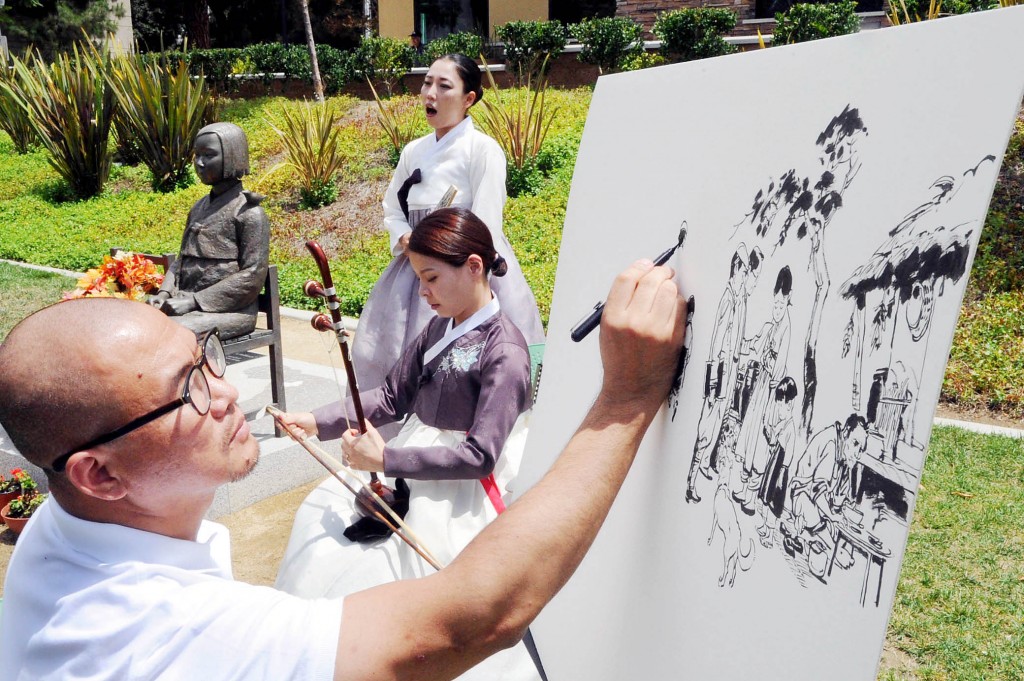
Artist Kim Jung-ki illustrates comfort women while two members of the Sooncheon performing arts company perform “Bong Seon-hwa” and “Arirang.” (Park Sang-hyuk/The Korea Times)
By Kim Hyung-jae
Verses of “Bong Seon-hwa” and “Arirang,” Korean folk songs, rang through Glendale’s Central Park Monday.
The commemoration of the one-year anniversary of the 1,100-pound “comfort woman” statue, which is still undergoing controversy, paired a performing arts company from Suncheon city with drawing artist Kim Jung-ki.
They staged a “spreading history” performance, with Kim Myung-jin and Kim Bo-ra singing folk songs while Kim Jung-ki illustrated young comfort women being taken by Japanese soldiers.
“We put on this event to show the horrors inflicted by Japanese soldiers while [former comfort women Lee Ok-seon and Kang Il-chool] are visiting America,” said Lee Chang-yup, Glendale planning commissioner.
Lee and Kang, however, boycotted the event after watching a play titled “Bong Seon-hwa” that was shown at the Glendale Alex Theatre the day before.
Lee and Kang felt the play — based on Yoon Jung-mo’s novel “Mother’s Name Was Cho-Sen Ppi” — depicts an inaccurate scene in which comfort women, wearing kimonos, throw around money, the Korean American Forum of California said.
The city of Glendale is currently fighting a lawsuit filed by a group of older Japanese Americans, who demand the statue — a young Korean comfort woman sitting next to an empty chair — be taken down. Meanwhile, the Korean community has requested a formal apology from the Japanese government concerning the so-called “comfort women,” young women from Korea, China, the Philippines and other countries who were abducted by Japanese soldiers during World War II to serve as sex slaves.








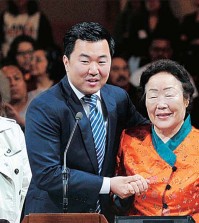
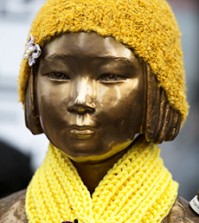
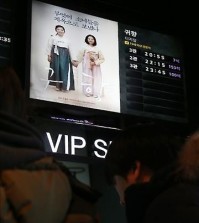
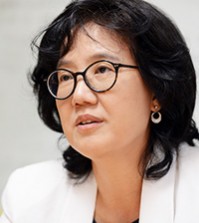





true fact
July 31, 2014 at 4:58 AM
Former Korean ‘comfort women’ for U.S. troops sue own government
http://news.yahoo.com/former-korean-comfort-women-u-troops-sue-own-104514461.html
REUTERS By By Ju-min Park July 11, 2014 6:45 AM
PYEONGTAEK South Korea (Reuters) – Cho Myung-ja ran away from home as a teenager to escape a father who beat her, finding her way to the red light district in a South Korean town that hosts a large U.S. Army garrison.
After she escaped home in the early 1960s, her pimp sold her to one of the brothels allowed by the government to serve American soldiers.
“It was a hard life and we got sick,” Cho, 76, said in an interview in her cluttered room in a shack outside Camp Humphreys, a busy U.S. military garrison in the town of Pyeongtaek, south of Seoul.
On June 25, sixty-four years after the Korean War broke out, Cho joined 122 surviving comfort women, as they were called, in a lawsuit against their government to reclaim, they say, human dignity and proper compensation.
The suit comes as an embarrassing distraction for the South Korean government, which has pushed Japan to properly atone for what it says were World War Two atrocities including forcing women, many of them Korean, to serve as sex slaves for its soldiers.
The women claim the South Korean government trained them and worked with pimps to run a sex trade through the 1960s and 1970s for U.S. troops, encouraged women to work as prostitutes and violated their human rights.
The suit was lodged with the Seoul Central District Court and Reuters has seen the document laying out the accusations against the government and a demand for 10 million won ($9,800) in compensation per plaintiff.
The Ministry of Gender Equality and Family declined to comment on the lawsuit. The U.S. military in South Korea said it was aware of reports of the lawsuit.
“USFK has a zero tolerance for prostitution and human trafficking,” a U.S. Forces in Korea spokesman said in response to a request for comment. “Prostitution and human trafficking are cruel, demeaning and incompatible with our military core values.”
“CIVILIAN DIPLOMATS”
true fact
July 31, 2014 at 5:08 AM
Why don’t you Americans build a statue of Korean comfort women served US troops in Korea as sex slaves ?
http://www.howitzer.jp/korea/page24.html
Terry Feletian
August 2, 2014 at 11:23 AM
The Korean & US activists are really able to blame Japan?
The testimony Korean comfort women made is exactly same as Korean comfort woman for US troops.
http://blogs.wsj.com/korearealtime/2014/07/15/claims-south-korea-provided-sex-slaves-for-u-s-troops-go-to-court/
konohazuku001
August 2, 2014 at 10:07 PM
Based on these following facts,there was no Korean comfort-woman unwillingly kidnapped by Japanese army or officials.
1.No one knows the names of the villages or towns where the comfort-women were actually kidnapped.
2.So far as the comfort-women kidnapping issue is concerned, there is no obvious record which had been written before 1990s.
3.It is quite strange that so many as 200,000 victims had kept silence from 1945 to the 1990s.
4.A large amount of money were paid to the Comfort-women in reward for their jobs. Back in those days,it was not a rare case that poor parents necessarily sold their daughters to get money.
5.There have been no witnesses who can testify the kidnapping incidents. If there had been many comfort-women who were kidnapped, there must have been many witnesses. But nobody saw the incident.
6.There was no real testimony by the kidnappers. It was already proved that Seiji Yoshida’s testimony was absolutely false statements. At that time in Korea, most of policemen and officials were Koreans, not Japanese.
7.There was no protest opposing to the kidnapped comfort-women.If there had been kidnapped comfort-women as real events, riots must have been raised.
8.In Korea, from time immemorial to now ,there always have been many prostituts. In the period of the World WarII,it is quite natural that there must have been prostitution markets there.
9.Most of Korean comfort-women say “I was sold.” or “I was deceived.” A small number of women say “I was kidnaped.” The credibility of their testimonies are in question. The contentions are rather suspect evidences.
10.Although The Japan-Korea Basic Relations Treaty was concluded in 1965, South Korea currently lodges various reasons in order to draw out as much money as possible from Japan.
However,at the time of the conclusion of the treaty, they never argued about the comfort-women issue at all.